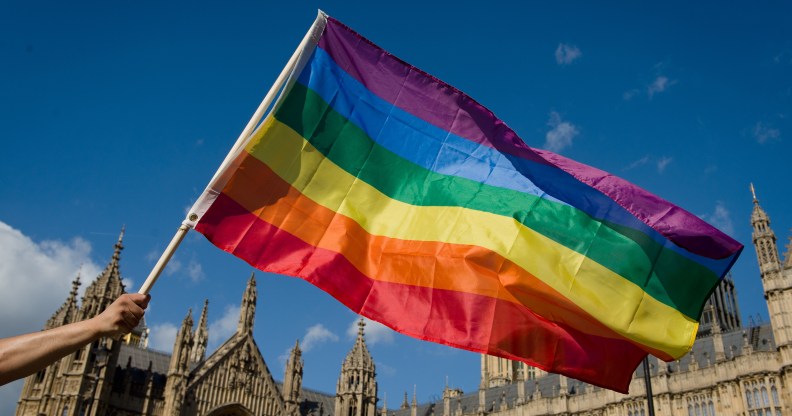Gordon Brown and David Cameron vote for gay regulations

A protester holds a rainbow flag outside the Houses of Parliament in central London on June 3, 2013, as protesters gather in support of same-sex marriage (LEON NEAL/AFP/Getty Images)
An attempt to block legislation that will protect gay people from discrimination has failed.
Tory MPs in the House of Commons forced a vote on the Sexual Orientation Regulations yesterday. However, the regulations passed by 310 votes to 100.
29 Tory MPs voted in favour of the regulations, among them party leader David Cameron, gay MPs Nick Herbert and Alan Duncan, Shadow Cabinet members George Osborne, David Willetts, Francis Maude and Theresa Villiers, and Shadow Equality spokesman Eleanor Laing.
The Chancellor of the Exchequer voted in favour of the regulations, as did Ruth Kelly, Secretary of State for Communities and Local Government, who is the cabinet minister responsible for equality.
Among the candidates for deputy leader of the Labour party, Hazel Blears, Harriet Harman and Alan Johnson all voted in favour of the regulations.
Sir Ming Campbell, Simon Hughes, Charles Kennedy, Mark Oaten and Stephen Williams were among 29 Lib Dem MPs who voted for the regulations.
They outlaw disrimination against gay, lesbian and bisexual people when accessing goods and services.
Lib Dem MP Evan Harris, who supports the new rules, voted in favour but said he felt their introduction had been rushed.
Tory MPs Ann Widdecombe, former Chancellor Kenneth Clarke and former leader Iain Duncan Smith voted against. The party had previously said that their MPs would be given a free vote.
Last Thursday a group of Tory MPs attempted to block the Sexual Orientation Regulations at committee stage, arguing that they had not been given proper time to debate them.
Equality minister Meg Munn told the BBC: “It’s standard practice for debates on secondary legislation to take place in a delegated legislation committee.
“The timing and venue for the debate was agreed between all three main parties.”
Now that the House of Commons has approved the regulations, they go before the House of Lords tomorrow.
A Tory peer, Baroness O’Cathain, has tabled an amendment likely to be put to a vote in the Upper House.
Peers are expected to spend around an hour discussing the regulations.
Her amendment reads:
“This House, having regard to the widespread concerns that the draft Regulations compromise religious liberty and will result in litigation over the content of classroom teaching, and having regard to the legality of the equivalent regulations for Northern Ireland, declines to approve the Equality Act (Sexual Orientation) Regulations 2007.”
Peers will then be asked to vote to strike down the regulations.
This is a similar tactic to the one tried by DUP peers in January, who attempted to rescind the Sexual Orientation Regulations for Northern Ireland, which have been in force since the beginning of 2007.
On that occasion, a motion by Lord Morrow was defeated when the House of Lords voted 199 to 68 to retain the regulations.
Baroness O’Cathain, an Irish-born businesswoman who was ennobled by John Major in 1991, has previously tried to stop gay couples adopting.
She sees herself as the leading opponent of gay rights in the Lords since the death of Baroness Young.
If the Sexual Orientation Regulations pass the Lords they will come into force on 30th April.
Click here to see a breakdown of the vote. Courtesy of publicwhip.org.uk

